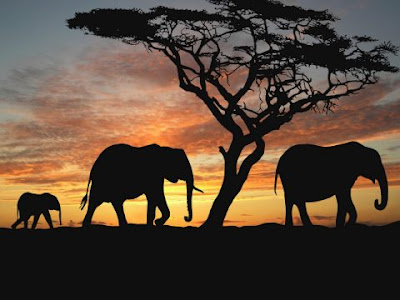Tuesday, August 27, 2019
For Thursday: Knighton, "Out of Sight" (pp.180-188)
Remember to read "Out of Sight" for Thursday's class; we'll have another quiz based on some of the questions below. These questions will also guide our discussion and give you ideas that will relate to our 'conversation' and the paper assignments to follow.
* Knighton writes that "a safari, by cliche and assumption, is overwhelmingly driven by photography" (181). How might photographs and the act of taking pictures get in the way of having an authentic experience with the environment?
* Why does the author learn that taste, as much as sight, is crucial to understanding the animals in a given environment? What can taste allow you to 'see' on a safari?
* The author talks of wanting to collect "audio postcards" in the essay. What is this, and why might it be as valuable as a photo--or even more so?
* What is the limitation to "simply point[ing] to a distant scene and label[ing] it with names and facts like captions" (184)? Why doesn't this really capture the beauty and danger of the wild?
* How might this essay relate to the world outside of the safari? Do we read the world too much with our eyes? What could we 'see' if we chose to listen--or taste--as much as look?
Thursday, August 22, 2019
For Tuesday: Anderson, "Peak America" (pp.28-36)
For Tuesday's class, be sure to read our first essay from The Best American Travel Writing, "Peak America." Usually when you read an essay for class, I'll give you a brief reading quiz over the material--a very short questions, and sometimes, a single essay question. This not only proves to me that you've read the material, but also, that you can apply it to bigger ideas outside of class and in your own life/culture.
NOTE: I always give you a few questions to consider on the blog as a 'reading guide,' to help you if you find the essay confusing, boring, or even too simple. Like the photograph we looked at on Thursday, there are so many different ways to read a single essay, so I want you to consider as many as possible before you give up on it. ALSO, the reading guide questions often show up in some form on the quiz...
READING GUIDE (to help you read the essay & prepare for the quiz)
1. When the author leaves the Mall of America, he says "we were on a different pilgrimage, in search of a different America" (28). What kind of 'America' is he looking for, and why does he call it a 'pilgrimage'?
2. How does knowing the context of Mt. Rushmore change how we 'read' it? How is it a little like the Weegee photograph we viewed on Thursday? Does it make the work more meaningful? Less? More problematic?
3. The author says that "Rushmore is a ubiquitous American image, tattooed on the inside of every citizen's eyelids" (33). What happens to him and his family when they finally do experience it first-hand? Does it live up to the expectation? Does it transform them? Move them? Excite them? Disappoint them?
4. At the end of the essay, Anderson writes, "There is something childish about this fantasy--the way it tends to conflate virtue and size. Why does goodness have to be huge?" (35). Based on this, what is his critique of not only Mt. Rushmore but the way Americans view history in general? How did he learn this at the monument?
Tuesday, August 20, 2019
Welcome to Fall 2019
Be sure to buy the two books for class immediately, since we'll start reading from The Best American Travel Writing 2018 next Tuesday, and Wild only a few weeks after. If you don't keep up with the reading, you will fail the quizzes (see the syllabus) and be unable to write the assignments, so don't fall behind simply because you don't have a book!
Let me know if you have any questions at jgrasso@ecok.edu or come to my office at HM 348. See you in class!
Subscribe to:
Posts (Atom)
-
Nancy Mairs, circa 1988 For Tuesday: Mairs’ On Being a Cripple (142-151) A few words I might look up if I were back in college... ...
-
Be sure to read "Paper Tiger" for next week and watch the video below, which discusses the importance of context for creating co...
-
Here's your second Writing Workshop video, about 17 minutes...I know that might seem annoying, but hey, at least I'm not talking f...



